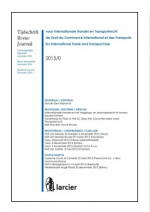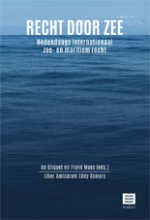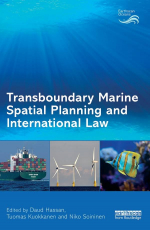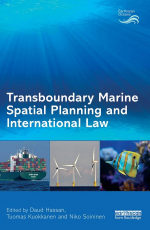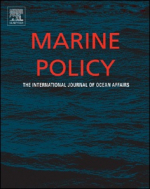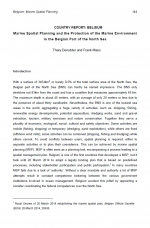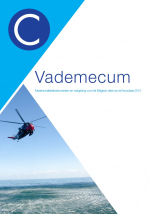Publications
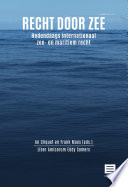
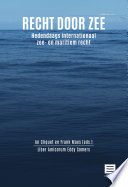
Mariene beschermde gebieden: een druppel in de oceaan?
(2015) Recht door zee. Hedendaags internationaal zee- en maritiem recht. Maklu, 81-113.
Liber amicorum Eddy Somers
Reconciling the law of salvage and finds with the protection of underwater cultural heritage: a stumbling block for common law states?
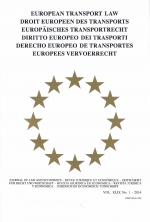
The Spanish Dock Labour Ruling (C-576/13). Mortal Blow for the Dockers’ Pools
[2015] 4-5 European Transport Law, pp. 551-581 and [2016] 7-8 Transportrecht (Germany), pp. 275-289
(an analysis of the milestone ECJ judgment on the Spanish dock labour system and its expected impact of future developments)
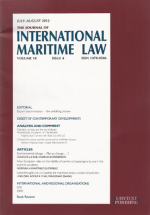
The renaissance of maritime codes. A need for international guidance
[2015] The Journal of International Maritime Law, 5-6
Hernieuwbare energie op zee en scheepvaart: het Belgisch marien ruimtelijk plan
(2015) Recht door zee : hedendaags internationaal zee- en maritiem recht. p.55-79
Liber Amicorum Eddy Somers
Marine spatial planning: global and regional conventions and organizations
Transboundary marine spatial planning across the French-Belgian maritime borders: past and future cooperation
Bargaining a net gain compensation agreement between a marine renewable energy developer and a marine protected area manager
(2015) MARINE POLICY . 60. p.40-48
When the development of marine renewable energy (MRE) is only possible inside already established marine protected areas (MPAs), and there is a risk of ecosystem loss, environmental or monetary compensation - being the last step in a hierarchy of mitigation measures - might be an option for working out a trade-off between energy production and nature protection. In this article,it is argued that for this type of siting situation,instead of the well-established strategy of no net loss, a net gain should be provided from the MRE developer to the MPA manager,which acts as an incentive for the manager to cooperate and covers future potentially lost conservation benefits due to MRE potential damages. Based on this argument, a hypothetical example is used to demonstrate that a net gain is ensured only when there is a societal surplus from a combined MRE - MPA arrangement that can be divided between the players through bargaining. However, when a symmetric information is involved, it is shown that cooperative solution concepts are more sufficient for leaving both players better off after coexistence than before.
Country report Belgium: Marine spatial planning and the protection of the marine environment in the Belgian part of the North Sea
(2015) IUCNAEL EJOURNAL. p.144-154
With a surface of 3454km2, or barely 0.5% of the total surface area of the North Sea, the Belgian part of the North Sea (BNS) can hardly be named impressive. The BNS only stretches out 83km from the coast and has a coastline that measures approximately 65 km. The maximum depth is about 45 meters, with an average of only 20 meters or less due to the presence of about thirty sandbanks. Nevertheless, the BNS is one of the busiest sea areas in the world, aggregating a huge variety of activities, such as: shipping, fishing, renewable energy developments, potential aquaculture, dredging works, sand and gravel extraction, tourism, military exercises and nature conservation. Together they serve a plurality of economic, ecological, social, cultural and safety objectives. Some activities are mobile (fishing, shipping) or temporary (dredging, sand exploitation), while others are fixed (offshore wind mills); some activities can be combined (shipping, fishing and dredging) while others cannot. To avoid conflicts between users, spatial planning is required, either to separate activities or to plan their coexistence. This can be achieved by marine spatial planning (MSP). MSP is often seen as a planning tool, encompassing a process leading to a spatial management plan. Belgium is one of the first countries that developed a MSP, but it took until 20 March 2014 to adopt a legally binding plan that is based on predefined processes, including stakeholder participation and public participation.1. In many countries MSP fails due to a lack of ‘authority’. Without a clear mandate and authority a lot of MSP attempts result in constant competence bickering between the various government institutions involved in ocean management. Belgium avoided this pitfall by appointing a minister coordinating the federal competences over the North Sea.
---
1. Royal Decree of 20 March 2014 establishing the marine spatial plan, Belgian Official Gazette (BOG) 28 March 2014, 26936.

Les sociétés privées de sécurité maritime dans la lutte contre la piraterie : Aspects légaux et opérationnels.
(F. Bruneel, Ed.) Maritiem Tijdschrift Neptunus (312), 10-19.
Aujourd’hui, le monde maritime ne s’occupe plus de savoir si les sociétés privées de sécurité maritime doivent être utilisées dans la lutte contre la criminalité maritime, mais plutôt de la façon dont elles peuvent être utilisées en toute sécurité, avec l'accent mis sur l'accréditation et la responsabilisation. En effet, l'argument de vente unique pour les entreprises de sécurité est qu'à ce jour aucun navire avec des gardes armés à bord n’a été détourné. Le 15 février 2011 la « International Chamber of Shipping (ICS) » a officiellement changé sa position et est devenu en faveur de l'utilisation de gardes armés. En conséquence, les estimations indiquent qu'en 2011 le pourcentage des navires qui emploient des gardes armés a augmenté d'environ 10 % à 50 %. Le 8 mars 2012, l'Organization maritime internationale (OMI) a publié une note intitulée « Actes de piraterie et vols à main armée perpétrés à l’encontre des navires » et a demandé aux États membres d'analyser la possibilité de l’emploi de personnel de sécurité privé à bord de leurs navires dans le cadre de leur législation nationale et de discuter de la manipulation d’armes à feu par ces personnes. Cependant, il y a de sérieux problèmes. Tout d'abord, alors qu'il est fort possible que ces gardes privés puissent protéger des navires contre toute attaque, il n'y a aucune garantie qu'ils peuvent ou qu'il seront toujours en mesure de le faire sans provoquer une escalade de la violence, sans mettre en danger des gens innocents, sans impliquer l'utilisation illicite de la force ou même provoquer des incidents internationaux. Un autre facteur, également plutôt d’ordre politique, a à voir avec la souveraineté de l'État. Certains chercheurs et certains États sont convaincus que la sécurisation des mers est une fonction gouvernementale et doit donc rester la prérogative des autorités publiques. Certains estiment que des bateaux ou navires privés ne peuvent en aucun cas usurper les fonctions gouvernementales simplement parce qu'ils sont en haute mer, mais ce qu’ils pourraient toujours faire, c’est de signaler des événements « curieux » ou de donner des informations au gouvernement en vue d'appréhender des terroristes. Cependant, d'autres soutiennent que le monopole sur l'usage de la force des autorités publiques, ne signifie pas que seul le gouvernement peut employer la force, mais aussi et surtout que c’est le gouvernement qui peut décider qui peut exercer la force et dans quelles conditions. Cela soulève la question de savoir s’il est légalement possible pour les États d’utiliser des sociétés privées de sécurité maritime à bord de navires de commerce.
Keywords
PMSC, Private Maritime Security Company, PCASP, Privately Contracted Armed Security Personnel, piraterie, piracy, Vessel Protection Detachments, VPD, sécurité maritime, maritime security
Vademecum: Mariene beleidsinstrumenten en wetgeving voor het Belgische deel van de Noordzee
Het Vademecum ‘Mariene beleidsinstrumenten en wetgeving voor het Belgisch deel van de Noordzee (2015)’ is een afgeleid product van het ‘Compendium voor Kust en Zee 2015: Een geïntegreerd kennisdocument over de socio-economische, ecologische en institutionele aspecten van de kust en zee in Vlaanderen en België’. Het Compendium komt tot stand door een samenwerking tussen verschillende academische groepen, overheidsinstanties, middenveldorganisaties en overlegplatformen met betrekking tot de kust en zee en wordt gecoördineerd door het Vlaams Instituut voor de Zee (VLIZ).
Het Compendium voor Kust en Zee kan online geraadpleegd worden op: www.compendiumkustenzee.be.
